COFFEE QUEST CONTINUES!



COFFEE QUEST CONTINUES!
Join our coffee adventure!- Or at least check out more Art Goodies here:
[Check out Toonimated’s Coffee Quest] <Take a look!
More Posts from J-drawings and Others
R.I.P. The 2976 American people that lost their lives on 9/11 and R.I.P. the 48,644 Afghan and 1,690,903 Iraqi and 35000 Pakistani people that paid the ultimate price for a crime they did not commit
“hi, i’m an author and this is my american character, chair lightbulb. in american, ‘chair’ means to be in a position of leadership, while ‘lightbulb’ means intelligence. yeah it’s kind of an unusual name in american. she’s always been distant from her american heritage, but her parents wanted her name to honor the american language, while still being unique. don’t worry, she’s very embarrassed about her heritage and it will hardly ever come up.”







You know those anime meta posts along the lines of “I was born with pink hair. The doctors told my parents I was a Main Character and ever since my life has not known peace from demons/spirits/sports competitions/harems who find me”
Well I see that, and I raise you this:
An anime boy whose appearance is, by absolutely anyone’s account, completely and utterly average. Mundane hair. Mundane eyes. Not even glasses to set him the tiniest bit apart. A simple, unmemorable, unrecognizable civilian among a backdrop of millions.
And he has a lot of passions, and a lot of ambitions, which he hones every chance he gets. He’s dabbled in sports and archery and cooking and just about anything you could wrap a competition around. And he’s competed in many of these. Every chance he gets. With all of his passion and all of his might.
He’s crushed by the competition every single time.
Until one day–one day something clicks for him. Something that should have seemed obvious from the start and yet never was–as though everyone, including himself, was unwittingly blind to it. It clicks, when he realizes every kid who’s beaten him in competition, every kid who’s gone on to fame and glory and acclaim, has been some candy-haired gel-spiked ridiculously-dressed fucker.
There’s some trend there that this Main Character boy can’t explain and can’t understand but he decides, this one time, fuck it. He’ll play along too. He’s got a model train competition in four days, and he’s got nothing more to lose. He hits up the department store, buys the pinkest, noxious-est, fruitiest hair dye he can find, the spikiest hair gel available, and the gaudiest clothes on the thrift rack. He enters the model train competition looking like a bubble gum gijinka.
And he wins.
Suddenly, the other candy-haired contestants notice him. They talk to him. They pledge rivalries. Girls notice him. Judges applaud him. Acclaimed model train aficionados offer him internships across the world. He’s hit on something.
The main cast expands to cover just about every candy-hair cliche in the book: from the mostly-normal-looking demure school girl with the blue hair to the Naruto-est, yelling-est boy with the red-and-green spiked hair. The cool megane senpais, the purple haired tsunderes, suddenly everyone is interested in him. They’re prodigies and upstarts and underdogs and they truly believe that this main character boy is one of them.
So the main character boy maintains his ruse. He touches up his roots at dawn every morning and carefully attends to his gelled spikes and tells absolutely no one about this great, uncanny, unfathomable secret he’s stumbled upon. He wins his competitions left and right. He racks up the acclaim. He’s hailed as a prodigy of all trades, just now bursting onto the scene, and boils to the top of all his candy-haired peers.
He’s rising up, his every dream within his grasp. Until one day he gets a note under his door, taped to an old picture of his Normal Boring self from middle school, that says “You don’t belong”
About the pulse room on Inside
I have the theory that this pulse was a first attempt at controlling gravity that failed horribly creating that deadly pulse.
I say this because the pole machines on the pulse room’s background are similar to the pole machines that are keeping the people and the water on the room that appears later on in the game.

Awhile ago @ouidamforeman made this post:
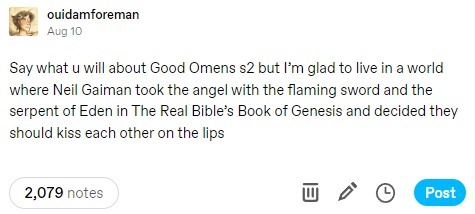
This shot through my brain like a chain of firecrackers, so, without derailing the original post, I have some THOUGHTS to add about why this concept is not only hilarious (because it is), but also...
It. It kind of fucks. Severely.
And in a delightfully Pratchett-y way, I'd dare to suggest.
I'll explain:
As inferred above, both Crowley AND Aziraphale have canonical Biblical counterparts. Not by name, no, but by function.
Crowley, of course, is the serpent of Eden.
(note on the serpent of Eden: In Genesis 3:1-15, at least, the serpent is not identified as anything other than a serpent, albeit one that can talk. Later, it will be variously interpreted as a traitorous agent of Hell, as a demon, as a guise of Satan himself, etc. In Good Omens --as a slinky ginger who walks funny)
Lesser known, at least so far as I can tell, is the flaming sword. It, too, appears in Genesis 3, in the very last line:
"So he drove out the man; and placed at the east of the garden of Eden Cherubims, and a flaming sword which turned every way, to keep the way of the tree of life." --Genesis 3:24, KJV
Thanks to translation ambiguity, there is some debate concerning the nature of the flaming sword --is it a divine weapon given unto one of the Cherubim (if so, why only one)? Or is it an independent entity, which takes the form of a sword (as other angelic beings take the form of wheels and such)? For our purposes, I don't think the distinction matters. The guard at the gate of Eden, whether an angel wielding the sword or an angel who IS the sword, is Aziraphale.
(note on the flaming sword: in some traditions --Eastern Orthodox, for example-- it is held that upon Christ's death and resurrection, the flaming sword gave up it's post and vanished from Eden for good. By these sensibilities, the removal of the sword signifies the redemption and salvation of man.
...Put a pin in that. We're coming back to it.)
So, we have our pair. The Serpent and the Sword, introduced at the beginning and the end (ha) of the very same chapter of Genesis.
But here's the important bit, the bit that's not immediately obvious, the bit that nonetheless encapsulates one of the central themes, if not THE central theme, of Good Omens:
The Sword was never intended to guard Eden while Adam and Eve were still in it.
Do you understand?
The Sword's function was never to protect them. It doesn't even appear until after they've already fallen. No... it was to usher Adam and Eve from the garden, and then keep them out. It was a threat. It was a punishment.
The flaming sword was given to be used against them.
So. Again. We have our pair. The Serpent and the Sword: the inception and the consequence of original sin, personified. They are the one-two punch that launches mankind from paradise, after Hell lures it to destruction and Heaven condemns it for being destroyed. Which is to say that despite being, supposedly, hereditary enemies on two different sides of a celestial cold war, they are actually unified by one purpose, one pivotal role to play in the Divine Plan: completely fucking humanity over.
That's how it's supposed to go. It is written.
...But, in Good Omens, they're not just the Serpent and the Sword.
They're Crowley and Aziraphale.
(author begins to go insane from emotion under the cut)
In Good Omens, humanity is handed it's salvation (pin!) scarcely half an hour after losing it. Instead of looming over God's empty garden, the sword protects a very sad, very scared and very pregnant girl. And no, not because a blameless martyr suffered and died for the privilege, either.
It was just that she'd had such a bad day. And there were vicious animals out there. And Aziraphale worried she would be cold.
...I need to impress upon you how much this is NOT just a matter of being careless with company property. With this one act of kindness, Aziraphale is undermining the whole entire POINT of the expulsion from Eden. God Herself confronts him about it, and he lies. To God.
And the Serpent--
(Crowley, that is, who wonders what's so bad about knowing the difference between good and evil anyway; who thinks that maybe he did a GOOD thing when he tempted Eve with the apple; who objects that God is over-reacting to a first offense; who knows what it is to fall but not what it is to be comforted after the fact...)
--just goes ahead and falls in love with him about it.
As for Crowley --I barely need to explain him, right? People have been making the 'didn't the serpent actually do us a solid?' argument for centuries. But if I'm going to quote one of them, it may as well be the one Neil Gaiman wrote ficlet about:
"If the account given in Genesis is really true, ought we not, after all, to thank this serpent? He was the first schoolmaster, the first advocate of learning, the first enemy of ignorance, the first to whisper in human ears the sacred word liberty, the creator of ambition, the author of modesty, of inquiry, of doubt, of investigation, of progress and of civilization." --Robert G. Ingersoll
The first to ask questions.
Even beyond flattering literary interpretation, we know that Crowley is, so often, discreetly running damage control on the machinations of Heaven and Hell. When he can get away with it. Occasionally, when he can't (1827).
And Aziraphale loves him for it, too. Loves him back.
And so this romance plays out over millennia, where they fall in love with each other but also the world, because of each other and because of the world. But it begins in Eden. Where, instead of acting as the first Earthly example of Divine/Diabolical collusion and callousness--
(other examples --the flood; the bet with Satan; the back channels; the exchange of Holy Water and Hellfire; and on and on...)
--they refuse. Without even necessarily knowing they're doing it, they just refuse. Refuse to trivialize human life, and refuse to hate each other.
To write a story about the Serpent and the Sword falling in love is to write a story about transgression.
Not just in the sense that they are a demon and an angel, and it's ~forbidden. That's part of it, yeah, but the greater part of it is that they are THIS demon and angel, in particular. From The Real Bible's Book of Genesis, in the chapter where man falls.
It's the sort of thing you write and laugh. And then you look at it. And you think. And then you frown, and you sit up a little straighter. And you think.
And then you keep writing.
And what emerges hits you like a goddamn truck.
(...A lot of Pratchett reads that way. I believe Gaiman when he says Pratchett would have been happy with the romance, by the way. I really really do).
It's a story about transgression, about love as transgression. They break the rules by loving each other, by loving creation, and by rejecting the hatred and hypocrisy that would have triangulated them as a unified blow against humanity, before humanity had even really got started. And yeah, hell, it's a queer romance too, just to really drive the point home (oh, that!!! THAT!!!)
...I could spend a long time wildly gesturing at this and never be satisfied. Instead of watching me do that (I'll spare you), please look at this gif:

I love this shot so much.
Look at Eve and Crowley moving, at the same time in the same direction, towards their respective wielders of the flaming sword. Adam reaches out and takes her hand; Aziraphale reaches out and covers him with a wing.
You know what a shot like that establishes? Likeness. Commonality. Kinship.
"Our side" was never just Crowley and Aziraphale. Crowley says as much at the end of season 1 ("--all of us against all of them."). From the beginning, "our side" was Crowley, Aziraphale, and every single human being. Lately that's around 8 billion, but once upon a time it was just two other people. Another couple. The primeval mother and father.
But Adam and Eve die, eventually. Humanity grows without them. It's Crowley and Aziraphale who remain, and who protect it. Who...oversee it's upbringing.
Godfathers. Sort of.

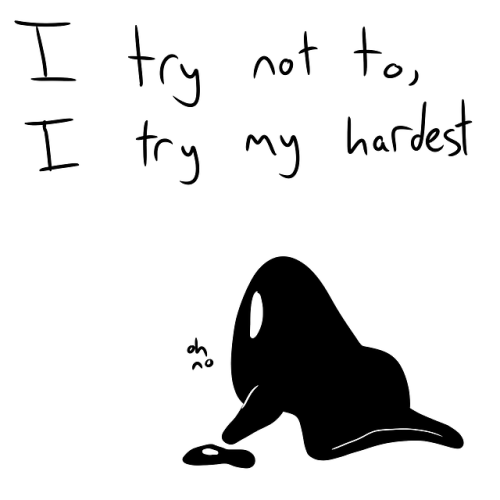
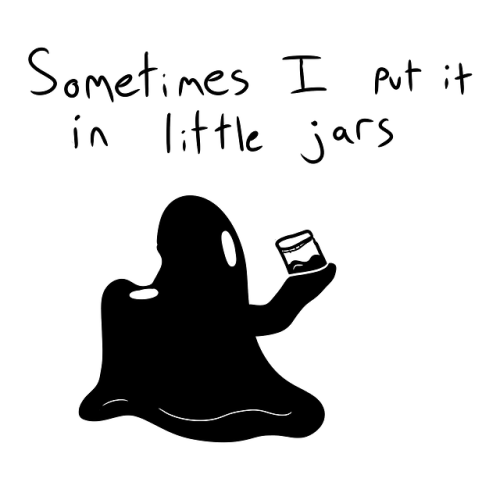

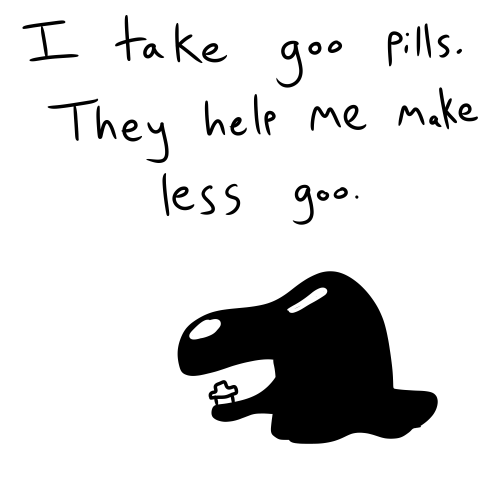
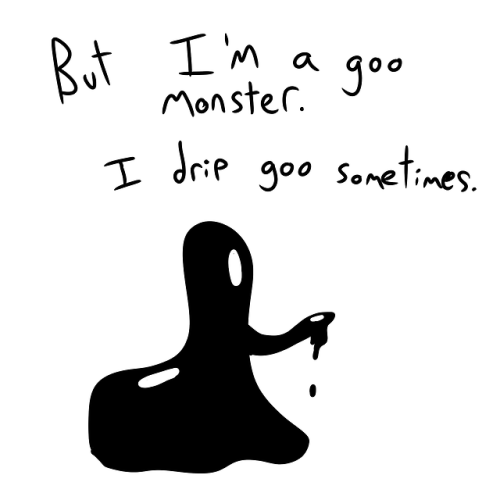


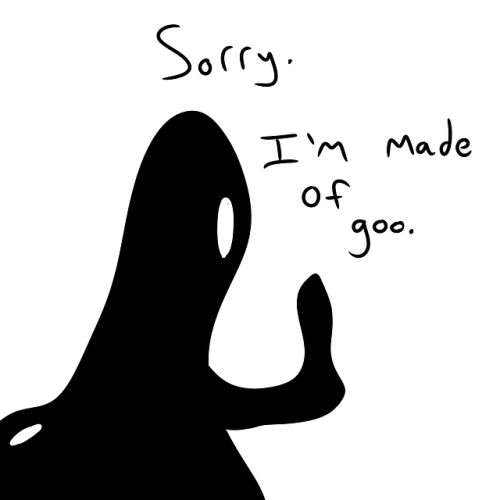









A comic about controlling your symptoms and trying to get other people to understand why it’s so hard to do so, in goo form
me, rewatching my favourite media for the hundredth time: it’s about the comfort. it’s about the nostalgia. it’s about lacking the necessary emotional bandwidth to take in and process new things in this year of our lord 2021
On how Blackbeard has two devil fruits
Maybe he makes the yami-yami cancel itself out (How? I have no idea) to use the other fruit.
-
 goroose liked this · 2 weeks ago
goroose liked this · 2 weeks ago -
 coyote-tricks reblogged this · 2 weeks ago
coyote-tricks reblogged this · 2 weeks ago -
 coyote-tricks liked this · 2 weeks ago
coyote-tricks liked this · 2 weeks ago -
 starlystudios liked this · 2 weeks ago
starlystudios liked this · 2 weeks ago -
 elianabixx liked this · 3 weeks ago
elianabixx liked this · 3 weeks ago -
 seboingus-shoelace reblogged this · 3 weeks ago
seboingus-shoelace reblogged this · 3 weeks ago -
 silverislander liked this · 4 weeks ago
silverislander liked this · 4 weeks ago -
 spinosacha reblogged this · 4 weeks ago
spinosacha reblogged this · 4 weeks ago -
 spinosacha liked this · 4 weeks ago
spinosacha liked this · 4 weeks ago -
 kirbysreturntodreamlanddx reblogged this · 4 weeks ago
kirbysreturntodreamlanddx reblogged this · 4 weeks ago -
 nagirart liked this · 4 weeks ago
nagirart liked this · 4 weeks ago -
 misscaputmortuum500 liked this · 4 weeks ago
misscaputmortuum500 liked this · 4 weeks ago -
 hoof-job-heaven liked this · 1 month ago
hoof-job-heaven liked this · 1 month ago -
 itsicemax liked this · 1 month ago
itsicemax liked this · 1 month ago -
 captain-chapish liked this · 1 month ago
captain-chapish liked this · 1 month ago -
 imaginesapphics liked this · 1 month ago
imaginesapphics liked this · 1 month ago -
 flyinggabriela liked this · 1 month ago
flyinggabriela liked this · 1 month ago -
 deifybread liked this · 1 month ago
deifybread liked this · 1 month ago -
 mylowmilo liked this · 1 month ago
mylowmilo liked this · 1 month ago -
 eagerblackholebaby liked this · 1 month ago
eagerblackholebaby liked this · 1 month ago -
 reallysaneguy liked this · 1 month ago
reallysaneguy liked this · 1 month ago -
 chamaleonsoul liked this · 1 month ago
chamaleonsoul liked this · 1 month ago -
 its-a-bi-vy liked this · 1 month ago
its-a-bi-vy liked this · 1 month ago -
 alien-interface reblogged this · 1 month ago
alien-interface reblogged this · 1 month ago -
 ladyofthecreeddraws reblogged this · 1 month ago
ladyofthecreeddraws reblogged this · 1 month ago -
 alexthetrashyraccoon liked this · 1 month ago
alexthetrashyraccoon liked this · 1 month ago -
 m00nj311y liked this · 1 month ago
m00nj311y liked this · 1 month ago -
 lii-makami liked this · 1 month ago
lii-makami liked this · 1 month ago -
 sp0rkeater reblogged this · 1 month ago
sp0rkeater reblogged this · 1 month ago -
 sp0rkeater liked this · 1 month ago
sp0rkeater liked this · 1 month ago -
 randomtheidiot liked this · 1 month ago
randomtheidiot liked this · 1 month ago -
 shereluck liked this · 1 month ago
shereluck liked this · 1 month ago -
 spidori reblogged this · 1 month ago
spidori reblogged this · 1 month ago -
 spidori liked this · 1 month ago
spidori liked this · 1 month ago -
 candelumessa liked this · 1 month ago
candelumessa liked this · 1 month ago -
 sleepy-kam1 reblogged this · 1 month ago
sleepy-kam1 reblogged this · 1 month ago -
 5-6-7-minus-9-lives reblogged this · 1 month ago
5-6-7-minus-9-lives reblogged this · 1 month ago -
 5-6-7-minus-9-lives reblogged this · 1 month ago
5-6-7-minus-9-lives reblogged this · 1 month ago -
 5-6-7-minus-9-lives liked this · 1 month ago
5-6-7-minus-9-lives liked this · 1 month ago -
 kirikenn reblogged this · 1 month ago
kirikenn reblogged this · 1 month ago -
 kirikenn liked this · 1 month ago
kirikenn liked this · 1 month ago -
 headshotheaven liked this · 1 month ago
headshotheaven liked this · 1 month ago -
 thesketchystar reblogged this · 1 month ago
thesketchystar reblogged this · 1 month ago -
 thesketchystar liked this · 1 month ago
thesketchystar liked this · 1 month ago -
 sandstriker liked this · 1 month ago
sandstriker liked this · 1 month ago -
 sandstriker reblogged this · 1 month ago
sandstriker reblogged this · 1 month ago -
 jimjamsortimtams liked this · 1 month ago
jimjamsortimtams liked this · 1 month ago -
 nickname2179 liked this · 1 month ago
nickname2179 liked this · 1 month ago -
 allaboutirony reblogged this · 1 month ago
allaboutirony reblogged this · 1 month ago -
 00ff00dreams reblogged this · 1 month ago
00ff00dreams reblogged this · 1 month ago